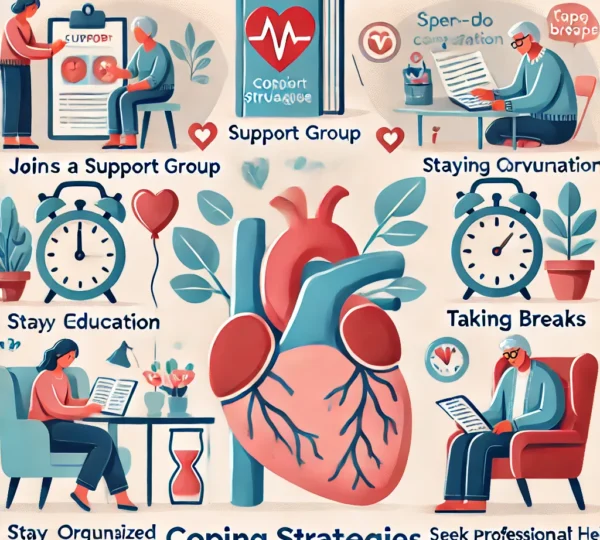Coping Strategies for Caregivers of Individuals with Cardiomyopathy
Coping Strategies for Caregivers of Loved Ones with Cardiomyopathy
Introduction: Caring for a loved one with cardiomyopathy can be challenging, but with the right coping strategies, caregivers can provide support while also taking care of themselves. Understanding the unique demands of this role is crucial for both the caregiver’s well-being and the health of the patient.
Understanding the Role of a Caregiver: Being a caregiver to someone with cardiomyopathy involves providing physical, emotional, and sometimes financial support. It’s essential to recognize the demands of this role and prioritize self-care to prevent burnout. Caregivers often juggle many responsibilities, including managing medications, attending doctor’s appointments, and addressing emotional needs. Therefore, setting aside time for oneself is not just beneficial; it’s necessary.
Coping Strategies for Caregivers:
-
Seek Support: Connect with other caregivers or support groups to share experiences and receive guidance. Knowing that you’re not alone can provide comfort and valuable insights. Local support groups or online forums can be great resources for finding others who understand your situation.
-
Educate Yourself: Learn about cardiomyopathy and its management to better understand your loved one’s condition and provide informed support. Knowledge empowers caregivers to advocate for their loved ones effectively.
online pharmacy buy zydena with best prices today in the USA
Understanding treatment options and lifestyle changes can also help you feel more confident in your caregiving role. -
Communicate Openly: Maintain open and honest communication with your loved one about their needs, preferences, and feelings. Encourage them to express themselves and actively listen to their concerns. Effective communication can strengthen your relationship and ensure that both you and your loved one are on the same page regarding their care.
-
Set Realistic Expectations: Understand that caregiving can be demanding and challenging at times. Set realistic expectations for yourself and your loved one, and don’t hesitate to ask for help when needed. Recognizing your limits can prevent feelings of frustration and inadequacy.
-
Take Breaks: Make time for yourself to recharge and relax. Engage in activities that bring you joy and rejuvenate your energy, whether it’s reading a book, going for a walk, or spending time with friends. Taking regular breaks can help you return to your caregiving duties with renewed focus and compassion.
-
Stay Organized: Keep track of appointments, medications, and important information related to your loved one’s care. Staying organized can help reduce stress and ensure that their needs are met effectively. Utilize planners or digital tools to manage schedules and keep important documents accessible.
-
Seek Professional Help: If caregiving becomes overwhelming, don’t hesitate to seek professional support from therapists or counselors who specialize in caregiver stress and burnout. Mental health professionals can offer strategies to cope with emotional challenges and provide a safe space to express your feelings.
online pharmacy buy paxil with best prices today in the USA
Conclusion: Caring for someone with cardiomyopathy requires patience, compassion, and resilience. By implementing these coping strategies and prioritizing self-care, caregivers can provide invaluable support to their loved ones while also maintaining their own well-being. Remember, taking care of yourself is not selfish; it enables you to be a more effective caregiver.
To seek medical advice, always consult a Doctor. Here are our recommended experts.
Click here
To read more on Heart Disease . Click Here


